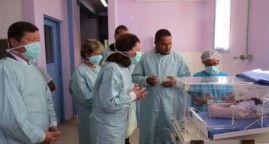The French National Humanitarian Conference
In a world where humanitarian needs are growing exponentially, numerous changes are disrupting the humanitarian system, heralding major transformations for the coming years.
It is in this context that The French National Humanitarian Conference took place and gathered more than 400 participants from France and abroad on February 23th.
The increase in forced displacement, the greater involvement of national actors in responses and the growing importance of certain issues such as climate change and innovative aid mechanisms are likely to have a significant effect on humanitarian aid.
Due to these changes, humanitarian action needs to be redirected towards new operational fields, via a more effective global response that distinguishes between crises of a different nature
After a day of debates and panel discussions, experts from The French National Humanitarian Conference presented statements and issued new proposals constituting a preamble to the first World Humanitarian Summit on 23 and 24 May in Istanbul
Acknowledgment and Proposals
Acknowledgment that the current situation is much preoccupying, with millions of victims around the world and equally worrying prospects for the future
The reasons for this situation are primarily political, notably for security crises, and can only be solved by political solutions.Consequently, humanitarian needs have grown in quantity and complexity.
A mixed assessment of the humanitarian sector, with some major steps forward in recent decades but also the recognition that the system is reaching its limits in terms of capacity
Positive steps forward
- The humanitarian system has become more structured in the last 20 years
Local stakeholders have developed their capacities, have gained in experience and have learned from the crises that have affected them. - New sources of funding have emerged through the private sector, foundations and emerging countries, and also through forms of solidarity from individual to individual, such as through diasporas.
- Finally, various promising technical and technological innovations have improved certain areas of aid and have contributed to increasingly draw the attention of the private sector.
A system which is reaching its limits due to the massive growth of the needs and the evolutions of the operational contexts
- The first limit concerns funding and funding instruments. There is insufficient funding. The volume of aid has been multiplied by 12 since 2000, but there continues to be a shortfall of about 15 billion US Dollars to cover all funding requests.
- The second limit is at the level of operators themselves. For Humanitarian actors need to revise their operational methods and think on the long term
- The third limit concerns coordination and the humanitarian system. Partnerships with local actors and the localisation of aid are at the heart of humanitarian system reforms. The system is too often disconnected from the reality of local contexts.
Proposals for ways of consolidating a “diversified humanitarian ecosystem, centred on populations and structured by humanitarian principles”, which would be able to meet current needs more effectively and prepare to meet the challenges of the future.
Given these observations and the issues raised, French humanitarian organisations are supporting the emergence of “a diversified humanitarian ecosystem, centred on populations and structured by humanitarian principles”.
In this ecosystem, everything should be done to prevent crises and end conflicts, notably with greater political commitments from governments to face situations of fragility and crisis. This ecosystem needs to end the dichotomy between development and emergency humanitarian actions. This implies that humanitarian actions have to better integrate medium and long terms agenda.
The growing role of local stakeholders needs to be more supported, without being naive or dogmatic, and taking local contexts into account as well as the political issues at stake in crisis situations.
It is also crucial to mobilise new resources and to ensure the effectiveness of the use of available resources to respond to the growing number of crises :
- New sources of funding;
- Using innovative funding;
- Adapting funding to the complexity of crises and situations;
- Lightening and harmonizing donors’ administrative procedures;
Facilitate access to funding for local NGOs by helping them to develop their organisational capacities.
->Read the “Key messages from the French National Humanitarian Conference”
->Read the “Topic Overview of the French National Humanitarian Conference”
Related Articles
“Together, emergency and development NGOs”
02/02/2015. Check out this video (in french) in wich Mike Penrose, CEO of Action against Hunger and Yvonnick HUET, CEO Agrisud International raise the issue between humanitarian relief and access to more sustainable development.
Neonatal Equipment inauguration in Sainte Fleur pavilion
04/06/2016. Motherhood Sainte Fleur is a maternity managed by the French Order of Malta in Madagascar.
‘Change or die’: aid charities told to stop competing for funds or face extinction
07/28/2017. Researchers warn major aid organisations will be sidelined by 2030 unless they change tack.






